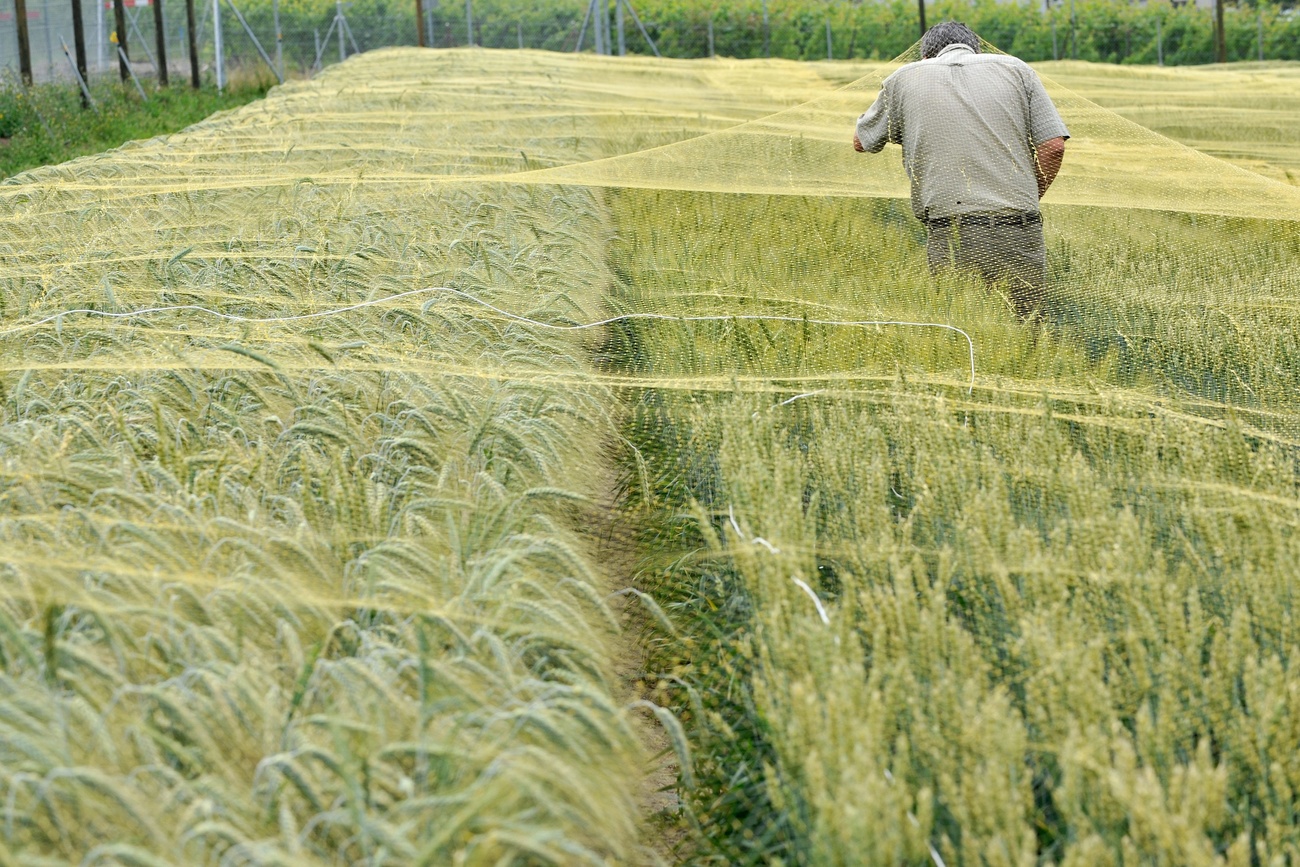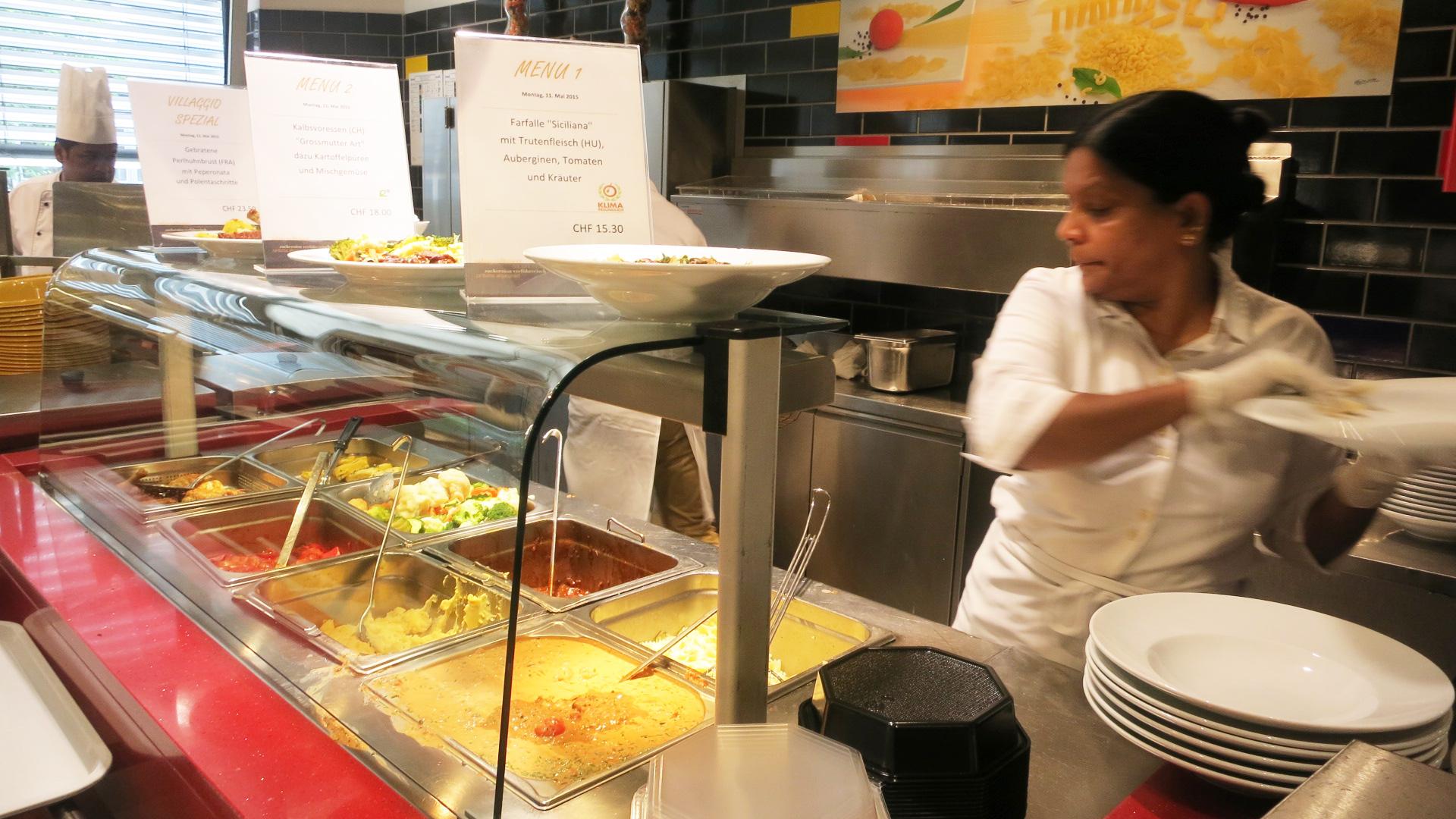你对借助基因组编辑技术改造我们的食物有何看法?
面对气候变化给地球造成的日益增大的压力,我们如何做才能养活全球人口?如今CRISPR-Cas9等基因组编辑技术被当作解决问题的途径摆上台面,却也引发了旗帜鲜明的支持和反对意见。
有人认为,这些改造已在自然界中发生或通过传统育种方法实现,新技术只是令其加速而已,同时新技术有助于开发出能够抵御虫害与气候变化的蔬菜及其他农作物。其他人则主张这可能威胁到人类健康与环境,还能被用来生产转基因作物,把外源DNA插入植物物种。他们还担心这些技术会增加大型农业企业对食品体系的掌控力度。
目前瑞士等国政府正在考虑是否及怎样监管农作物的基因组编辑。
你对基因组编辑技术及如何对其监管都有哪些想法?
阅读文章 基因组编辑食品背后的争议
阅读文章 基因组编辑专利问题引发对粮食未来的隐忧
这不是一门绝对的科学。 它是反复的,正因为如此,我们不应该在后代携带编辑基因的情况下使用 crispr。
虽然crispr可能被用于科维病毒,也可能没有,但很明显,原始的天然病毒经过了处理,增加了 "功能增益",我们都经历了这种影响。
Its not an absolute science. It's iterative and because of this we should NOT use crispr in situations where subsequent generations carry edited genes. there are simply too many unintended consequences.
although crispr may or may not ave been used for the covid virus, it is clear that the original natural virus was manipulated to add "gain of function" and we all experienced the effects.
https://scitechdaily.com/decade-long-study-challenges-traditional-views-of-evolution/
他们的研究成果最近发表在《美国国家科学院院刊》(PNAS)上,这些研究成果是在十年研究的基础上取得的。研究小组利用先进的基因组技术,分析了近 1000 个水蚤的 DNA 样本。
他们发现,自然选择对单个基因的作用强度每年都有很大不同,从而保持了变异,并通过为自然选择提供原材料,增强了适应未来不断变化的环境条件的能力。
此外,《自然》杂志 https://www.nature.com/articles/s41564-024-01752-4 于 7 月 8 日发表了《依赖环境的相互作用塑造了整个自然微生物组的基因内容模式》一文。
这两个研究项目都支持我下面的评论。
https://scitechdaily.com/decade-long-study-challenges-traditional-views-of-evolution/
Their findings, recently published in the journal Proceedings of the National Academy of Sciences (PNAS), rely on a decade of research. Using advanced genomic techniques, the research team analyzed DNA samples from nearly 1,000 Daphnia.
They discovered that the strength of natural selection on individual genes varies significantly from year to year, maintaining variation and potentially enhancing the ability to adapt to future changing environmental conditions by providing raw material for natural selection to act on.
Also, Nature Magazine https://www.nature.com/articles/s41564-024-01752-4 on 8 July published Environmentally dependent interactions shape patterns in gene content across natural microbiomes
Both of these research projects support my comments below.
最新的生化研究表明,生物体(如水蚤)内部的基因化学与环境影响产生共鸣并交换生化信息。这项新研究表明,基因更像是脚印,而不是积木。在我看来,基因表明了生物体的生化 "经验"。因此,操纵基因似乎是不负责任的。
Latest biochemical research indicates that genetic chemistry inside an organism ( ex Daphnia water fleas) resonate and exchange biochemical information with environmental influences. This new research implies that genes are more like footprints than building blocks. It seems to me that genes indicate the biochemical " experience" of an organism. As such it seems irresponsible to manipulate genes at all.
瑞士自 2005 年起暂停种植转基因作物,这实际上与欧盟的立场一致。最初将外来 DNA 引入作物基因组的转基因方法使用的是粗糙的技术,导致作物确实含有外来 DNA。与欧盟和瑞士相反,美国、加拿大和其他一些国家已经采用了转基因作物,因此目前美国种植的大豆、玉米、棉花和甜菜中 90% 以上都是转基因作物。环保主义者最初的担忧是,转基因是一种非自然的方法,由此产生的作物有可能将横向基因转移到其他生物体内,对人类健康构成潜在威胁。然而,自转基因作物首次问世以来的 30 年里,尽管全世界种植了数十亿公顷的转基因作物,但没有任何证据表明这些担忧发生过。现在,随着 CRISPR/cas-9 等 NGT(新基因组技术)的出现,作物基因可以在不插入外来 DNA 的情况下被精确定向。事实上,NGT 类似于人类数千年来的传统植物育种方法,只是速度更快,效率更高。因此,从科学角度看,瑞士继续暂停使用 NGT 培育农作物新品种的依据并不充分。欧盟已经认识到了这一点,并起草了一项新的法律,将 NGT 与转基因作物区分开来,有关讨论仍在进行中。鉴于采用经 NGT 改良的作物品种可能给农民和消费者带来巨大利益,瑞士议会也认为有必要重新考虑维持全面暂停的做法,因为这种做法已经过时,而且过于谨慎,是建立在未实现的风险基础上的。 不过,瑞士人是否会同意取消暂停令还有待观察。
In Switzerland we have a moratorium in place since 2005 that effectively bans GM crops, a position which is effectively aligned with that in the EU. The original GM methods to introduce foreign DNA into crop plant genomes used crude techniques resulting in crops that did contain foreign DNA. Contrary to the EU and Switzerland, USA and Canada and some other countries have adopted GM crops so that today more than 90% of all soya, maize, cotton and sugar beet grown in the US is GM. The original concern by environmentalists was that GM was an unnatural method, and the resultant crops posed a risk of horizontal gene transfer into other organisms and was a potential health risk to humans. However, in the 30 years since their first introduction and despite billions of hectares of GM crops being grown worldwide there is no evidence any of these fears having occurred. Now with the advent of NGT (New Genomic Techniques) such as CRISPR/cas-9, crop genes can be precisely targeted without the insertion of foreign DNA. In fact, NGT resembles traditional plant breeding practised by humanity for thousands of years, except being much faster and efficient. Therefore, scientifically there is little valid basis for maintaining a moratorium in Switzerland against new crop varieties developed using NGT. This has been recognised in the EU and a new law has been drafted differentiating NGT from GM crops and on which discussion is ongoing. Given the potentially huge benefits to farmers and consumers in adopting crop varieties improved by NGT, Parliament in Switzerland also see the need to reconsider maintaining a blanket moratorium which is outdated and excessively precautionary and based on unrealised risks. Whether the Swiss will agree to lift the moratorium however remains to be seen.
你还没听说过 "全美妈妈 "吗?这是一个由母亲组成的俱乐部,她们发现,当她们正常出生的孩子吃了美国国内正常生长的食物后(大多数正常生长的常规农作物现在都是用转基因的草甘膦抗性作物种植的)......她们的孩子出现了自闭症症状!......!后来,他们的孩子吃了 100% 的有机、生物种植的食物后痊愈了。
Ah, so you have not heard of Mom's Across America.?? This is a club of mother's who discovered that when their normally born children ate normally grown food inside the USA ( most normally grown conventioal farming is now grown with genetically modified glyphosat resistent crops) ..that their children developed sy.ptoms of autism!! Which subsequently healed on diets of 100% organic, biologically grown food.
别管我们的食物。没有任何借口.....,这是没有必要的。几个世纪以来,人们一直在耕作,没有对食物进行基因改造。我们的食物比现在的健康得多。
Leave our food alone. There's no excuse.....this isn't necessary. People have been farming for centuries without genetically modifying food. And we had much healthier food than what we have today.
整个现代病虫害预防方法都是错误的。实际上,要想种植出营养丰富的超级美味食品,根本不需要任何杀虫剂、除草剂、杀菌剂、转基因技术或基因组技术。
在过去的 30 年里,我们一直在利用我们的 HH- 技术这样做。请点击此处查看。www.ggi.org.uk。
The whole modern approach to pest and disease prevention is misdirected. There is actually no need for any pesticides, herbicides, fungicides, GM technology or Genome technology in order to grow the best nutrient rich super tasting food.
we have been doing this for the last 30 years with our HH- technology. check it out here. www.ggi.org.uk
目前,欧盟的法律同样适用于新的和旧的转基因生物(GMOs)。这规定了对投放市场的转基因生物的风险评估、明确的标签和可追溯性。但欧盟委员会打算将由新的基因工程技术(NGM)生产的转基因生物排除在现有转基因生物立法之外。如果计划中的放松管制得以实施,目前在开发管道中的所有NGV工厂中约95%的风险评估、可追溯性和标签要求将不再适用。这将是解决转基因食品被消费者拒绝这一事实的一个优雅的解决方案。没有标签,就没有人知道我们的食物中含有什么。因此,强大的种子和化学品公司可以期待获得更大的利润。
Aktuell gilt für neue und alte gentechnisch veränderte Organismen (GVO) das gleiche EU-Recht. Dieses sieht eine Risikoprüfung, eine klare Kennzeichnung sowie die Rückverfolgbarkeit der in Verkehr gebrachten GVO vor. Aber die Europäische Kommission beabsichtigt, GVO, die durch neue gentechnische Verfahren (NGV) erzeugt werden, von der bestehenden GVO-Gesetzgebung auszuklammern. Wird die geplante Deregulierung umgesetzt, entfallen die Risikobewertungen, Rückverfolgbarkeits- und Kennzeichnungsvorschriften für etwa 95 % aller NGV-Pflanzen, die sich derzeit in der Entwicklungspipeline befinden. Damit liesse sich der Umstand, dass Gen-Food von den Konsument:innen abgelehnt wird, auf elegante Weise lösen. Denn ohne Deklarierung weiss niemand mehr, was in unseren Lebensmitteln steckt. Die mächtigen Saatgut- und Chemieunternehmen blicken also noch grösseren Gewinnen entgegen.
与美国(我在纽约市长大)相比,瑞士文化对各种文化价值都有区分。为什么要引入一种昂贵而又有问题的技术来破坏这种多样性,因为这种技术要么会导致营养质量的严重标准化,要么会使经过时间考验的科学术语完全混乱?基因操纵就像从图书馆里拿出一本书,然后从书中撕下几页......粘贴到其他书的特定位置。我希望瑞士的政治家们比美国人明智。
Compared to the USA ( I grew up in NYC) Swiss culture distinguishes between every form of cultural value. Why jeopardize such diversity by introducing an expensive, questionable technology that will either lead to gross standardizations of nutritional quality or complete chaos in time tested scientific nomenclature?? Genetic manipulation is like taking books out of a library, and tearing pages out of the books..to paste into specific places into other books. I hope Swiss politicians are wiser than American.
在日本,育种的方法被用来增加可供人类食用的植物数量。
我认为基因组编辑正在以一种方便商业的方式改变事物。我认为这很危险。
日本では、品種改良という方法で、人間が食べられる植物を増やしていきました。
ゲノム編集は、商売に都合のいいように変えているように思います。これは危険だと思います。
CRISPR不一定是最快、最安全的,也不一定是经济上或生态上最合理的。
关于CRISPR在种子育种方面的潜力的数据不能掩盖四个关键点。
1.最近的方法和技术,如快速育种,意味着如果你有足够的试验,可以在玻璃温室里一年循环六代,用基因组选择来挑选出好的品系,而不需要进行田间试验。培育异质种群的速度会更快。
2.我们的消化系统和免疫系统是进化过程的结果,这些进化过程与我们整个星球的生态系统的进化过程同时发生。
食物对我们的消化系统和免疫系统的健康显然是内在的,忽视进化过程有可能是高度破坏性的,威胁到我们的健康和我们所依赖的生态系统的健康。
3.3. 近几十年来,农业综合企业的整合导致少数企业控制了大规模食品系统所依赖的大部分种子品种的知识产权。
CRISPR技术有可能导致我们的食品系统中出现非常高的专利水平。这可能会继续巩固这一进程。
整合虽然看起来提供了明显的规模经济,但也推动了对农业化学品使用的更多依赖。作物品种的知识产权通常为农业综合企业所拥有,这些企业也拥有农用化学品的版权)。农用化学品被证明会导致生态环境恶化,增加温室气体的生产和排放(从硝酸铵的生产和使用到除草剂、杀菌剂、杀虫剂等的生产和使用)。
顺便说一句,所谓的 "规模经济 "在很大程度上是错误的。合并在许多方面证明了这些企业是亏损的。他们只有通过购买和资产剥离来吸引新的投资,包括通过在这些业务中禁用人力来削减成本,才能生存下来。
4.我们的食品系统需要更多的营养,更好的分配和更多的平等,而不是更多的数量。
根据粮农组织的数据,如果食物浪费是一个国家,它将是地球上第三大温室气体排放者。
今天大约有10亿人在挨饿,20亿人超重。
而我们对我们的食品系统中这些深刻而可怕的缺陷的认识已经有了一些年头。
许多人呼吁进行积极的变革,但我们需要的变革却没有到来。可悲的是,报告显示,行业和政策惰性的原因是既得利益者的行动。
CRISPR需要在良好的监管框架下进行,需要对整个供应链进行高水平的审查。
食物需要被视为对人类和生态的滋养,而不仅仅是一种营销商品。
如果不能解决上述问题,就会威胁到我们成功应对今天气候和自然紧急情况双重危机所带来的挑战的能力。
CRISPR is not necessarily fastest, safest, or most economically nor ecologically sensible.
The data on CRISPR’s potential for seed breeding mustn't obscure four key points.
1. Recent methods and technologies such as speed breeding mean that it is possible to cycle through six generations a year in a glasshouse and use genomic selection to pick out the good lines without field testing if you have enough trials to make a prediction from previous years. Breeding a heterogeneous population would be even faster.
2. Our digestive systems and our immune systems are the result of evolutionary processes that occurred alongside evolutionary processes across the whole of our planet’s ecological systems.
Food is clearly intrinsic to the health of our digestive systems and our immune systems and ignoring evolutionary processes is potentially highly destructive and threatens our health and the health of the ecosystems we rely on.
3. Consolidation in agribusiness over recent decades has led to a very few businesses controlling the Intellectual Property of much of the seed varieties large scale food systems depend upon.
CRISPR techniques potentially lead to a very high level of patenting in our food systems. This is likely to continue the consolidation process.
Consolidation while seemingly offering apparent economies of scale are also driving more reliance on agrochemical use. Crop variety IPs are often owned by the agribusinesses who also copyright agrochemicals). Agrochemicals are proven to cause ecological degradation and increase production and emission of GHGs (from production and use of ammonium nitrate right through to production and use of herbicides, fungicides, pesticides and more besides).
As an aside, so-called ‘economies of scale are largely false. Consolidation is in many ways proof that these business are loss generating. They survive only by attracting new investment through purchasing, and asset stripping including cutting cost by disabling human agency in those businesses.
4. We need greater nourishment, better distribution and more equality in our food systems, not more volume.
According to the FAO if food waste was a country it’d be the third highest emitter of GHG on the planet.
Around a billion people are hungry today, and two billion are overweight.
And we’ve had this knowledge of these deep and terrible flaws in our food systems for some years now.
Many have called for positive change and yet the change we need does not come. Sadly, reports show that the reason for industry and policy inertia is the action of vested interests.
CRISPR needs to be performed under well-regulated frameworks and needs high levels of scrutiny across supply chains.
Food needs to be taken as a nourishment for people and for ecologies, not simply a marketing commodity.
Failure to address the above points threatens our ability to successfully meet the challenges presented to us today from the dual crises of the climate and nature emergencies.
你好,史蒂文。逐一回答:
1.快速繁殖实际上是提高繁殖效率的好方法。但这并不是一种替代方法(如您所建议的),而是我们要使用的一种新系统。当你通过转基因生物或选择性育种来培育一种新植物时,一个很大的问题是你至少需要 6-7 种(转基因生物显然更快)。这必须是一种让它更快的新方法,而不是替代方法。
2.当然,我们的消化系统和免疫系统是与进化过程同时发生的。但是,当你使用CRISPR技术改造一种植物时,你并没有改变进化。你只是把几十年才能完成的工作在几年内完成了。如果你手里有一个大番茄和一个味道不错的番茄,你可以把它们分开,花几年时间直到你得到你想要的番茄;或者你可以寻找负责的基因,然后做出一个同样的番茄,只包括你想要的特征。
3.实际上,用来说明知识产权如何被少数企业控制的图表显示,拥有最多专利的两个机构都是公共机构。
4.营养品的最大问题恰恰在于配送,因为蔬菜在运输过程中无法抵抗时间或条件的影响。而让蔬菜、水果或任何你想要的东西抵抗这种情况的最好方法,就是通过 CRISPR。正如我之前所说,你也可以用传统方法来做,但你需要花费更多的时间来获得相同的产品,甚至是最差的产品(因为同样的方法,你引入了你想要的特性,你也可以引入一些你不想要的特性。
CRISPR 是未来的趋势。这是我们拥有的最好、最快的方法。它很安全,因为 1. CRISPR 系统只进行基因转化,然后就会被细胞消除。2. 我们的消化系统不会吸收 DNA,所以吃一个通过 CRISPR 或传统杂交技术编辑过的西红柿没有任何区别。3.CRISPR 被用于人类的基因治疗,效果非常好。我不认为你或任何人会拒绝基因疾病的解决方案。或胰岛素,它是由转基因细菌生产的。
同样,你可能在这些情况下看不到问题(因为没有问题),你也不应该在改造植物上看到问题。
很抱歉我的英语不好,我好久没用了。如果您有任何疑问或想与我讨论,请找我。
Hello Steven. Answering one by one:
1. Speed breeding it's actually a good way to improve the time we spend on breeding. But its not an alternative (as you propose) but a new sistem we would use. When you make a new plant GMO or by selective breeding, one big problem it's that you need at least 6-7 (obviously GMOs are faster). It has to be a new way to make it faster, not an alternative.
2. Our digestive systems and our immune systems are the result of evolutionary processes that occurred alongside evolutionary processes, of course. But when you use CRISPR to modify a plaant, you're not changing evolution. You are just make what you could do in decades in a few years. If you have in one hand a big tomato and in another hand a tomato that taste nice, you could croos them and spend years until you have the tomato you wanted; or you could look for the responsible gene and make a the same tomato including ONLY the characteristic you were looking for.
3. Actually, the graphic use to show how Intellectual Property it's being controlled by a few enterprises shows that the two institutions with the most patents are public.
4. The big problem about nourishment it's precisely the distribution due to vegetables does not resist the time or conditions during transport. And the best way to make a vegetable, fruit or whatever you want resistant to that, it's by CRISPR. As I said before, you could do it by conventional way, but you would spend much more time for having the same product or even a worst product (because same way you introduce the characteristic you wanted you could introduce some you didn't.
CRISPR it's the future. It's the best and fastest way we have. It's safe, because 1. the CRISPR system only works to do the genetic transformation, then it's eliminated by the cell. 2. our digestive systems does not incorporate DNA, so eating a tomato edited by CRISPR or by conventional cross, has no diference. 3. CRISPR it's being used in gene therapy in HUMANS, with very good results. I don't think you or anyone would reject a solution for a genetic illness. Or insuline, that it's produced on GMO bacteria.
Same way you probably don't see the problem on those cases (because there is not a problem), you shouldn't see the problem on modify plants.
Sorry for my english, I haven't use it in a while. If you have some doubt or want to discuss, here I am.
难道没有人想知道为什么我们在所有最先进的国家都有肥胖的紧急情况吗?是不是因为我们喂给动物的所有激素和物质使它们变胖了?现在我们想改变他们的DNA?这似乎不是一个好主意。遗传学是一门处于起步阶段的科学。我们并不真正知道这对我们这些吃货来说意味着什么。
让我们回到吃自然的、传统的食物,我们都会好起来的。
Nessuno si chiede per quale motivo abbiamo un'emergenza obesità in tutti i paesi piu' avanzati? Non sarà mica per tutti gli ormoni e le sostanze che diamo da mangiare agli animali per farli ingrassare? Adesso vogliamo pure alterarne il DNA? Non mi sembra una buona idea. La genetica e' una scienza agli albori. Di fatto non sappiamo cosa questo comporterebbe per noi che li mangiamo.
Torniamo a mangiare cibo naturale, preparato secondo tradizione e staremo tutti meglio.
转基因食品、垂直农业、实验室培植的肉类、在田间地头种植和放牧的新鲜食物......这为继续发展住房和进一步快速的城市扩张以适应不断增长的世界人口留下了大量的土地和绿色空间。
如果世界人口因营养不良导致出生率和预期寿命大幅下降,以及其他许多原因,如流行病、大流行病和战争而急剧萎缩,如果所有的住房和混凝土丛林变得多余,那会发生什么?
GM food, vertical farming, lab grown meat, fall in fresh food grown and grazed outdoors in fields … great leaves far more land and green space available for the continuing development of housing and further rapid urban spread to accommodate the growing world population.!
What happens then, if the world population dramatically shrinks through risks associated with poorer nutrition leading to a large reduction in birth rate and life expectancy and many other causes such as epidemics, pandemics and wars and if all of the housing and concrete jungles become superfluous..
我们每个人每天都消费什么?同样的食物?许多东西有什么不同?一些基因、蛋白质、维生素和脂类。 每次你吃一个西红柿,你是否认为它的营养很好,与你上个月吃的那个西红柿相等? 玉米或豆子或花生与你去年吃的一样吗?
有什么区别,为什么?这对营养或风险有影响吗? 可能没有。如果你吃的是好的混合饮食,是素食还是肉食?你应该有很多的多样性?谁会因改变而有风险,为什么? 如果你对西红柿过敏,你就不应该吃西红柿。如果你对花生过敏,你就不应该吃花生。在不同的花生收成或品种中,过敏原的表达和浓度是否存在一些差异? 是的,但我们大多数人不会知道或关心。 如果您对花生过敏原Ara h 2过敏,您应该避免食用所有花生。有些花生可能有较低的Ara h 2表达量,但你无法确定。 如果你对花生不过敏,这并不重要。
基因可以通过植物育种,或通过感染某些植物病毒而改变。 一旦基因被改变,一般都会育成真品,除非你杂交育种。 肥料能带来变化吗? 也许吧,但通常是针对整个蛋白质混合物或作物的其他成分。 我在转基因作物和新型食品生物的安全评估方面花了大约25年时间。基因编辑的变化并不比自然突变,或在植物的近亲繁殖种群中的繁殖更糟糕。 变化的目标才是最重要的。引入一个编码花生过敏原的新基因,如果放在大米中,就会很糟糕。 因为大米不能被贴上标签。
请不要对食品安全表现得如此怀疑,以至于不敢吃东西。 如果你有食物过敏或乳糜泻,或糖尿病,你需要小心你的饮食。否则,要吃多样化的饮食。
What do we each consume every day? The same food? What is different for many things? A number of genes, proteins, vitamins and lipids. Each time you eat a tomato do you think it is nutritionally good and equal to the one you ate last month? Is corn or beans or peanut the same as you ate last year?
What are the differences and why? Does it matter for nutrition or risk? Probably not. If you are eating a good mixed diet, is it vegan or meat? should you have a lot of diversity? Who is at risk and why from the alterations? If you are allergic to tomato, you should not eat tomatoes. If you are allergic to peanut, you should not eat peanuts. Are there some differences in the expression and concentration of allergens across peanut harvests or varieties? Yes, but most of us will never know or care. If you are allergic to peanut allergen Ara h 2, you should avoid all peanuts. Some may have low expression of Ara h 2, but you cannot be sure. If you are not allergic to peanuts, it does not matter.
The genes can be changed by plant breeding, or by infection with certain plant viruses. Once the genes are changed, they will generally breed true, unless you cross-breed them. Can fertilizers make a difference? Maybe, but usually it is for whole protein mixes or other components of a crop. I have spent ~ 25 years on safety evaluation of GM crops and novel food organisms. The changes by gene editing are not worse than natural mutagensis, or breeding across outbred populations of plants. The target of changes is what matters. Introducing a new gene that encodes a peanut allergen would be bad if it is put in rice. Because rice cannot be labeled.
Please do not act so suspicious of food safety that you are afraid to eat. If you have food allergies or celiac disease, or diabetes, you need to be careful of what you eat. Otherwise, eat a varied diet.
作为一个退休的人,我终于可以说,这个食物的事情都是由腐败的人炮制的垃圾。
在我十几岁的时候,有饥饿的群众,我们仍然有他们......我吃得太多了。餐馆里的分量通常都很大,在德国情况更糟。
我的祖国提供了大量的肉类等。
对我这个年龄的人来说,我认为这个星球上没有足够的食物是一个骗局。
我的兄弟曾经在他的生意中清理过餐馆后面的集装箱,他对食物的浪费感到震惊,那是三十年前的事情了。
我反对转基因食品,但我赞成贴标签。标签上的信息不够多。
现在是2022年,我们被推到了数字时代,但在我看来,我们仍然不能给食品贴上足够的标签。
As a retired person I finally can say that this food thing is all garbage cooked up by corrupted people.
When I was a teenager there was starving masses and we still have them... I over eat. Portions in restaurants are usually big and it is worse in Germany.
My homeland serves up big amounts of meat etc.,
To me at my age I think it is a scam that there is not enough food on this planet.
My brother used to clear away, his business, the containers behind restaurants and was shocked at the waste of food and that was thirty years ago.
I am against GMO food but I am FOR labelling. Not enough information on labels.
It is 2022 and we are being pushed in digital ?? and yet we still cannot label food enough in my opinion.
基因操纵的食物将导致缺陷性疾病。我们吃的食物含有大量的天然化学物质,许多是人体所需要的。这些天然化学物质不会出现在转基因生产的食物中。
genetically manipulated food will result in deficiency diseases. The food that we eat contains a multitude of natural chemicals, many needed by the body. These natural chemicals will not be present in genetically produced food.
如果我们开始对我们的食物进行工程设计,那么我们多久会开始对自己进行工程设计?
正如下面的弗兰克所指出的,我们浪费了17%的食物。许多国家的农业生产率非常低。许多国家都吃得过多。他们的公民因此而超重和不健康。一些国家由于农业工人的短缺,有大片的农业用地没有使用。
在不求助于基因工程的情况下,有可能改善和提高粮食产量。
我已经接近80岁了,我记得我小时候只吃甜草莓。
草莓必须在成熟的时候采摘,而不是在适合将它们运过一个大陆或运到另一个大陆的物流时采摘。
许多其他农产品也是如此。
在那些自称富裕的发达国家,食物必须便宜。重点是数量。
这一点必须改变。人们应该按照大自然的旨意,吃得更少,质量更好。
作为一个绝对的最低限度,所有的转基因食品都应该有适当的标签,以便消费者有选择。
If we start engineering our food, how long before we start engineering ourselves?
As Frank below points out, we waste 17% of our food. Many countries have very low productivity of farming. Many countries are overfed. Their citizens are overweight and unhealthy as a result. Some countries have tracts of agricultural land unused due to shortages of workers in agriculture.
There is a scope to improve and to increase food production without resorting to genetic engineering.
I am close to 80, and I remember eating only sweet strawberries when I was a kid.
Strawberries have to be picked when ripe., not when it suits the logistics of transporting them over a continent, or to another continent.
The same goes for lots of other farm products.
In developed countries who claim to be wealthy, food has to be cheap. The emphasis is on quantity.
This has to change. People should eat less and better quality, as nature intended.
As an absolute minimum, all GM food should be properly labelled so consumers have choice.
非常感谢你的想法。采摘成熟的草莓和用塑料包装装好运到世界各地的草莓味道竟然如此不同。看来,关于基因组编辑的辩论应该从我们的饮食/消费方式这一更广泛的角度来进行,而不是简单地讨论技术问题。再次感谢您的分享。
Thank you very much for your thoughts. It is amazing how different strawberries taste when they are picked ripe than eaten out of a plastic package shipped across the world. It does seem that the debate on genome editing should be in the broader context of the way we eat/consume rather than simply on the technology. Thanks again for sharing.
自古以来,人类一直在与那些反对变革或让缺乏知识的人滋生恐惧和抵制的人抗争。
Since the dawn of time, man has contended with those who oppose change or allow lack of knowledge to breed fear and resistance.
您好,在关于基因组编辑食物的讨论中,您从哪些方面看到了滋生恐惧和抵触情绪?您认为基因组编辑食物是解决世界粮食问题的好方法吗?还是不同意?为什么?
我们非常感谢所有有助于建设性讨论的评论。
Hi, where do you see breeding fear and resistance in the discussion about genome editing our food? Do you think genome editing food is a good way to combat problems with feeding the world? Or do you disagree? Why?
We do appreciate all comments that contribute to a constructive discussion.
转基因食品缺乏人体所需的多种天然化学物质,会导致缺乏症。
Genetically produced food will lack the diversity of natural chemicals needed by the body resulting in deficiency diseases.
为什么没有修改人类基因来阻止多胎生育并保持大自然发展的地球状态完好无损?
لماذا لا يتم تعديل جينات الانسان ليتوقف عن الانجاب المضاعف ويبقي حال الارض على حاله كما طورته الطبيعة .
我们不需要转基因或人工食品、昆虫等。
我们已经浪费了至少17%的大量食物。总的来说,这些食物浪费占我们二氧化碳排放量的6%,但它却被忽视了,而相比之下,每个人似乎都在恐慌航空业的排放,而航空业的排放仅占1%。
We don't need GMO or artificial food, insects, etc.
We are already wasting a massive 17% of food, at least. In total this food waste is responsible for 6% of our CO2 emissions, yet it's ignored, whereas in comparison everyone seems to be panicking about aviation emissions which are just 1% !
让我们说实话吧。这对普通人(如我)来说有点太复杂了。我们只希望科学家们能找到未来养活地球的方法,而不是一方面被官僚和另一方面被贪婪所阻碍。
Let's be honest. This is getting a bit too complicated for the ordinary folks (like me). Let's just hope the scientists will find ways to feed the planet in future and not be hindered by bureaucrats on the one hand and greed on the other.
我同意这个话题很复杂。我觉得这个解释很有帮助。或者在你看来,哪里太复杂了?
https://www.swissinfo.ch/eng/explainer--the-controversy-behind-genome-editing-our-food/47288954
I agree this topic is complicated. I found the explainer very helpful. Or where does it get too complicated in your eyes?
https://www.swissinfo.ch/eng/explainer--the-controversy-behind-genome-editing-our-food/47288954
如果你能管理 "羊",并确保它们以合乎道德的方式去你想去的地方,那么你可以通过各种方式。
如果你保证对我们的食物进行合乎道德的改造,那么就让自然成为自然。不要试图过于聪明。
If you can govern "sheep" and make sure they go where you want them to go in an ethical way. then yes by all means.
If you guarantee that ethical modification of our foods are done, then let nature be nature. Don't try to be overly clever.






加入对话